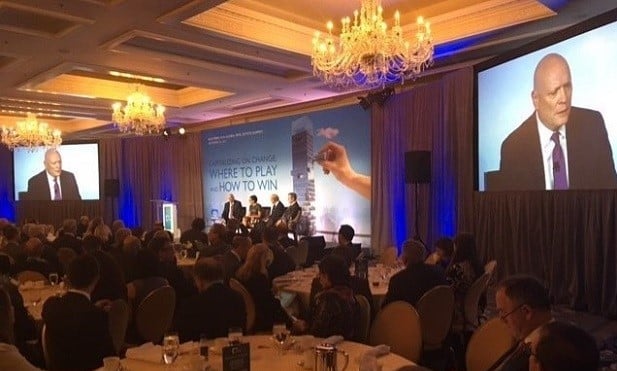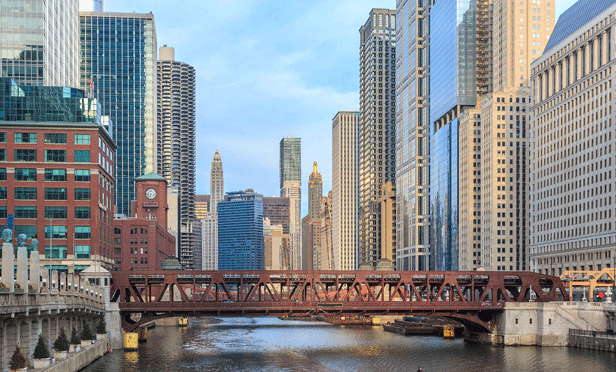CHICAGO—Commercial real estate executives have been trying to take the measure of Donald Trump ever since he landed in the White House. At the beginning of this year, one of the worries was the possible wholesale tearing up of trade agreements that buoy a lot of the infrastructure that facilitates imports. Most of those fears have not come to pass. However, a whole new set of concerns, mostly about instability, both foreign and domestic, but also about tweets, have arisen, and industry leaders keep trying to gauge how the new administration will impact their ability to do business.
Therefore, it's perhaps no surprise that much of yesterday's discussion during a lunchtime panel at DLA Piper's 14th Global Real Estate Summit revolved around President Trump. The global law firm brought in former US Secretary of Commerce Penny S. Pritzker, former Democratic US Senator and Senate Majority Leader George J. Mitchell, and former Republican US Senator and Secretary of Defense William S. Cohen, to hash out the latest news and try to make sense of it all. And some of the signs are troubling.
“We still don't have a full government in place,” said Pritzker. Many US embassies don't have ambassadors, for example, even in key nations, and this could soon harm American efforts to do overseas business. In addition, the president has not fully staffed many federal agencies and Cabinet-level departments, a situation that will create uncertainty. She attributed some of the foot-dragging to the incoming administration's sheer surprise at being handed the reins of power. “They didn't expect to win. But here we are in the fall, and things should be further along from a management standpoint.”
Mitchell, also chairman emeritus of DLA Piper, did not disagree with this assessment, but then said the long-term prospects of the US were quite bright, no matter what short-term challenges it faces. “We tend to dwell on our problems, but in relative terms, we will remain the dominant power as far ahead as human beings can see.” He admits that right now there is tremendous discord, especially on cultural issues, but due to the country's strong institutions, “we'll get through all that.”
However, Mitchell also sounded a warning for the nation's business elite. Trump was elected partly due to a backlash from many voters against Washington, and those ill feelings won't go away even if the economy takes off. “They don't feel like the beneficiaries, but the victims.” And that could promote instability and disruptions for years. The danger, in fact, will only grow as additional technological changes, such as driverless vehicles, threaten more job classes with elimination.
“But we're not addressing the problem; we're yelling at it,” he said. Mitchell still celebrates scientific advances and the subsequent economic progress, “but we have to see to it that the benefits flow to the whole society.”
Cohen shares Mitchell's generally sunny outlook, but he also sees some dark clouds gathering. Namely, the president's attempt to denigrate US institutions, including the media, the courts and Congress. “There is a coarseness in our society that is being exploited,” and if that effort is successful, people will find themselves “living in a fact-free universe.”
As a member of the House Judiciary Committee in the 1970s, Cohen said he got a firsthand view of the Watergate scandal and the conflicts it caused. “I think the mood today is more poisonous, more toxic.”
Want to continue reading?
Become a Free ALM Digital Reader.
Once you are an ALM Digital Member, you’ll receive:
- Breaking commercial real estate news and analysis, on-site and via our newsletters and custom alerts
- Educational webcasts, white papers, and ebooks from industry thought leaders
- Critical coverage of the property casualty insurance and financial advisory markets on our other ALM sites, PropertyCasualty360 and ThinkAdvisor
Already have an account? Sign In Now
*May exclude premium content© 2024 ALM Global, LLC, All Rights Reserved. Request academic re-use from www.copyright.com. All other uses, submit a request to [email protected]. For more information visit Asset & Logo Licensing.









